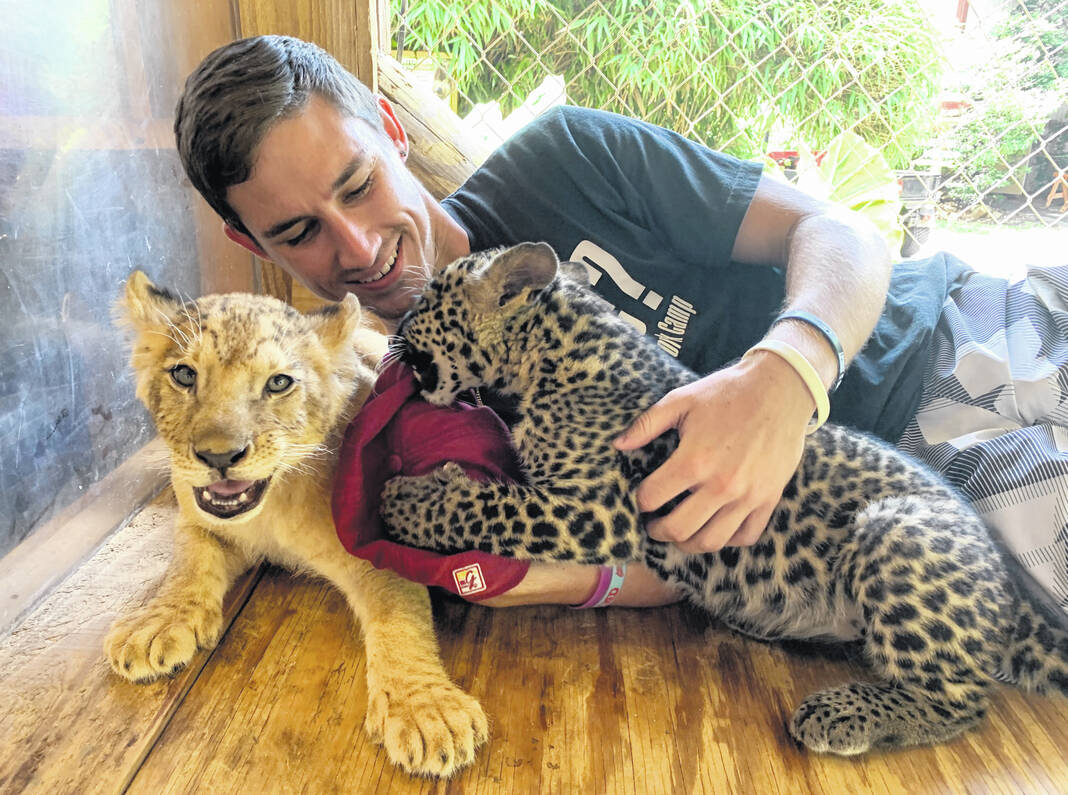
Most of Wilmington College’s agricultural students majoring in animal science plan to work with beef, dairy, sheep and similar livestock found on Ohio farms.
Senior Colton Smith wants to work with marine animals like dolphins, seals and sea lions.
His internships the past two summers reflect his interest in not-so-run-of-the-mill species. Indeed, he helped ensure the Atlantic Ocean’s population of sea turtles in 2021, and this summer he worked with lions, tigers, monkeys and a category he designated as “everything else” at a preserve for endangered animals hosting 100-plus species.
Smith is a transfer student from the University of Findlay, but Wilmington College has been a familiar place all his life. The Wilmington resident and 2018 Wilmington High School graduate is the son of WC alumna and longtime staff member Tammy Shadley-Hutton, senior director of advancement operations.
“I’ve always had an interest in animals — I can’t tell you how many zoos or aquariums I went to as a child,” he said. “I didn’t think much about jobs in that field then, but as I got older, I’ve learned there are so many opportunities. It was great to realize that my interests in animals can lead to a career and not just be a hobby.”
Smith interned at an animal hospital in Surf City, N.C., that assists sea turtles injured from such encounters as boating accidents and fishhook incidents. “I chopped up a lot of fish and squid,” he said about one of his tasks at the infirmary.
The other half of his internship involved the scheduled release of turtles on nearby Topsail Island. He investigated areas where sea turtles laid their eggs in the sand to ensure the nests were safe from tides, predators and beachgoers while also performing tasks facilitating the success of turtle hatchlings’ often perilous journey into the ocean.
“It was very cool working in a natural environment with your feet in the sand,” he said.
He knew it would be difficult to top that summer internship until he learned about opportunities at Tiger World, a preserve for endangered wildlife in Rockwell, North Carolina. The non-profit, accredited zoo features scores of species including bears, birds, kangaroos, ligers, lynx, sloths and wolves, in addition to rare tigers and lions.
Smith’s 12-week internship allowed him to spend three weeks in each of the preserve’s four areas. “We gave tours, set up and staffed education stations — and we kind of became knowledgeable in each area after three weeks,” he said.
The centerpiece of his summer experience was working closely with four cubs: three lions and a leopard. No tigers were born there this summer.
“The leopard cub was 2 years old when I arrived at Tiger World and a lion was pregnant,” he added.
Once she had her cubs, Smith became part of a rotation of interns who fed them every three hours. He also helped ensure the big cats received their dietary supplements and vitamins as a truck loaded with 600 pounds of chicken and beef made the rounds at feeding time each day.
“I don’t think I ate chicken tenders for about two weeks after I started working with all that raw chicken,” he said.
Smith mentioned some of the big cats were born in captivity while others were “straight-up rescues” from the wild. “There’s a big difference between them and those bottle-fed since birth,” he said.
While he worked in enclosures with the cubs, some of the highly trained, permanent staff members gained “free contact” with select big cats. “I saw them go in with a 400-pound tiger,” he added, noting some of the rescued cats had traumatic pasts and, known as “hot animals,” would never be placed face-to-face with a human.
Even though his rotations took him from the lion and tiger areas to the monkey and “everything else” corners of the zoo, Smith always returned to the cats to check on those cubs with which he worked directly. “Their size difference between birth and 14 weeks was remarkable!” he said.
As often and closely as he interacted with the cubs throughout the summer, Smith wonders if they would remember him after five or more years, a marvel of nature that is often seen between wild animals and humans in popular documentaries. “Would they pick up my scent? I’d be interested to know if the lions would recognize me,” he said. “I know they are potentially very dangerous animals, but hopefully, I’ll get to stand with them in an enclosure someday.”
Smith understands the sentiments of those who are opposed to zoos and believes all animals should be left to fend for themselves in the wild. “I’m glad people are concerned about animals — I’m concerned too,” he said, noting Tiger World has many species that are extinct in the wild.
“It’s important to remind people that, if we were not taking care of them in captivity, we’d lose that specie of animal.”
After two summers in North Carolina working with unique reptiles and animals, Smith looks forward to his Wilmington College graduation in May and the pursuit of his interest in aquatic species, possibly with the goal of training dolphins, seals and sea lions. He earned his certification in SCUBA diving this summer to facilitate that pursuit.
“I have a love for the big cats, but I’m leaning on the marine side. I’m impressed with their high levels of intelligence,” he said, convinced his summer internships coupled with knowledge gained through his college academics have provided foundational experiences that will make him especially marketable in his chosen field.
“I hope (potential employers) see I took the initiative to spend my summers doing these internships, which was unpaid work. I also want them to see the variety of animals I worked with,” he said. “I’ve been lucky to have such exciting college internships.”


